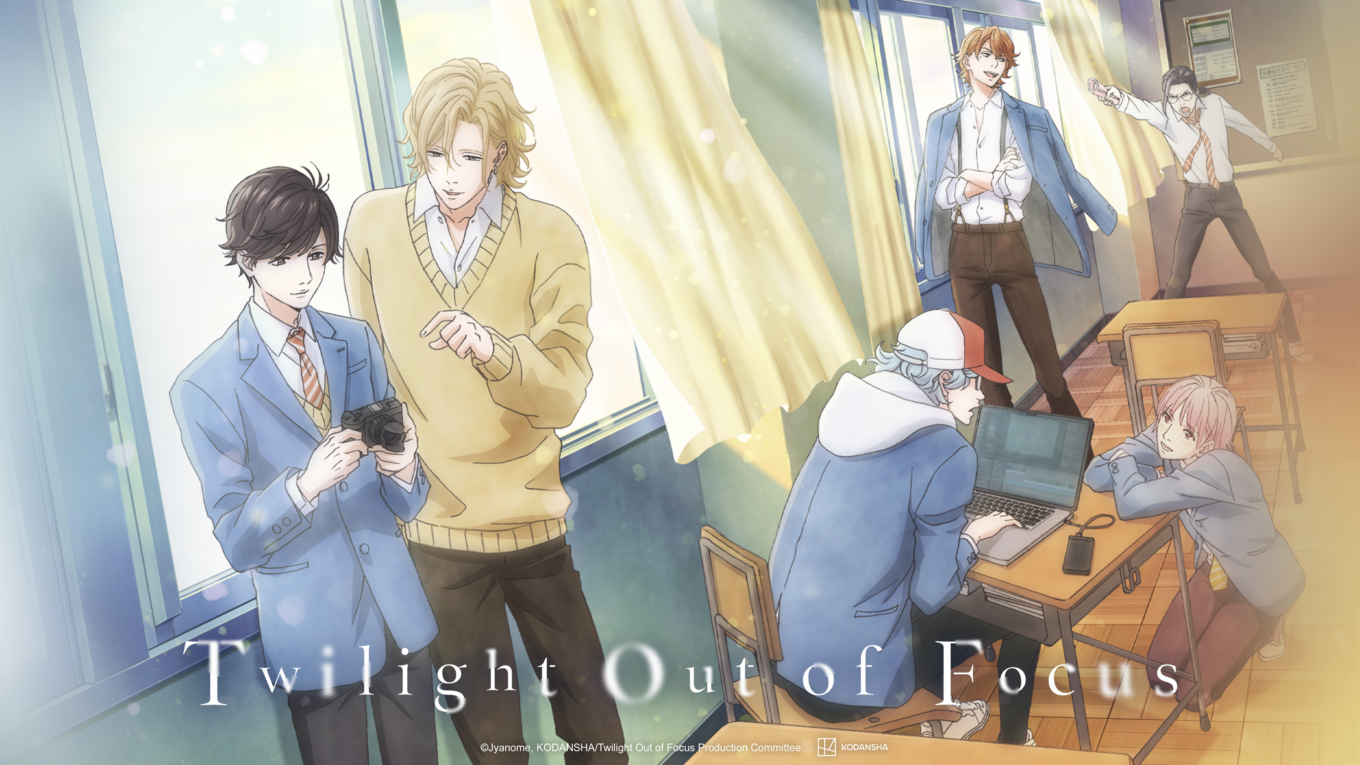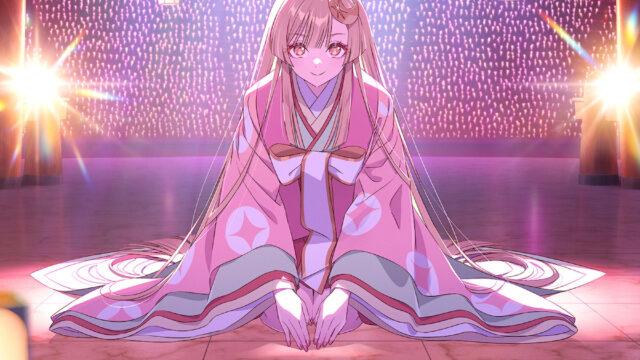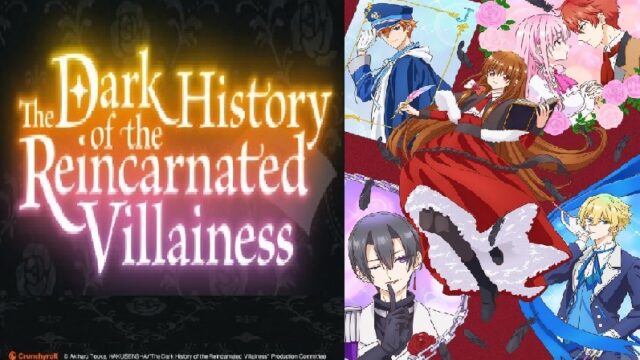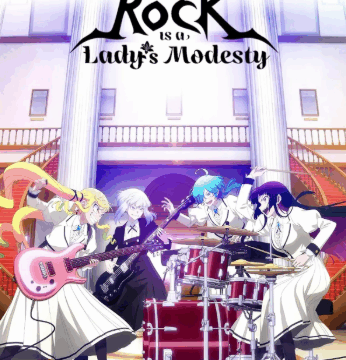English Dub Season Review: Twilight Out of Focus Season One
Overview (Spoilers Below):
A boys’ school film club is the backdrop for three tales of new romance. Mao (Eduardo Vildasol) and Hisashi (Joshua Waters) pair up for a project, make three promises, and draw closer together in the process. The club president, Jin, and a jealous junior named Giichi (Ben Stegmair) clash before finding common ground. Shion, a first-year student, joins the film club in search of a boyfriend and butts heads with Rei—until Rei asks him on a date.
Our Take:
Twilight Out of Focus is an anime adaptation of a Japanese manga series written and illustrated by Jyanome. It was directed by Toshinori Watanabe, and Yoshimi Narita wrote the script. It is produced by Studio Deen, known for producing other shows like Ranma 1/2, Fruits Basket, and Re:Monster. Yoko Kikuchi handled the character designs, and Satoshi Hono and Kaori Nakano composed the music. The opening theme song, “Crank Up,” is performed by Ikusaburo Yamazaki, and the ending theme, “UnchainxUnchain,” is sung by Amber’s.
Film has a way of resembling stories that passionate creators want to tell. They can either be full of action, comedy, or even romance. For the latter, it could be between a boy and a girl or between people of the same sex. This show, in particular, emphasizes this same-sex relationship, but in a more cheesy, yet charming, way. Twilight Out of Focus is another anime showcasing its LGBT representation front and center. However, instead of displaying one romantic relationship in an entire season, the series focuses on three of them residing in the same film club in an anthology-type format because one love story just isn’t enough to capture the feels.
Besides my on-and-off experiences with romance anime, the only element from Twilight Out of Focus that immediately captured my attention was its setting. The show’s three romance arcs occur in the same film club, where the different sets of characters find love in the most unusual ways. Whenever there’s a movie or show that involves film, I’m immediately hooked, as I have been a fan of watching and talking about movies for a long time. While this one doesn’t focus as much on the filmmaking aspect as the romance, I always enjoy seeing the art of film portrayed in a piece of content, let alone an anime. However, that’s not the only reason for my interest.
With the release of Twilight Out of Focus, Crunchyroll seemed to have been hit with some backlash involving the removal of the site’s comment section, possibly to avoid receiving toxic comments for its concept. It’s not just this series that fell victim to its deletion; the site’s entire catalog is left without a space for watchers to comment on. It’s a dumb idea, but regarding how cruel and toxic social media is nowadays, it’s also understandable. However, upon watching the series, it’s evident that this is not worth deleting the comments section or getting “worked up” about. But does it mean it’s worth a recommendation for romance enthusiasts? Yes, but I would also say it’s nothing too special regarding the formula.
Twilight Out of Focus consists of three tales centering on characters overcoming obstacles while falling in love. One of these is when camera operator Mao promises actor Hisashi that he will never fall in love with him, although that doesn’t last very long. The other is the film club president Jin, who finds a common interest in BL manga through his rival Giichi. Finally, we have Shion joining the film club to find a boyfriend, only for him to learn how to appreciate other things besides finding love. The conflicts in these arcs were relatively tame compared to the other romance anime, but that doesn’t make the show boring. Not every romance anime needs to have high-stakes conflict to be good. If it compensates with its tranquility and the charm and likability of the characters’ chemistry, it’s suitable enough for me to give it a pass. Twilight Out of Focus offered those elements to deliver a sweet, yet corny, BL anime that’s also occasionally self-aware of its romance tropes.
If I were to choose which mini-arc is my favorite, I would pick the third one involving Shion Yoshino and Rei Inaba. Despite Shion being a tad annoying sometimes in terms of his personality, the third mini-arc happened to have the most interesting development of the three. Shion attends many school clubs to find a boyfriend but ends up quitting when he cannot find one. However, when he attends the film club, he finds an unexpected candidate in the form of deadpan Rei and learns to love himself when attempting to give the film club a chance. It’s the perseverance that transforms Shion from a selfish, romance-obsessed fan to a genuine person.
Of course, the series’ primary focus is Mao and Hisashi, who appeared in the first four episodes before returning in the final two. Their personal conflict involves them making three promises, one of which is that Mao does not out Hisashi as gay. But, as the series progresses, they wind up falling head over heels for each other while working on the club’s short film. Despite the low stakes and the fourth episode, “Like the Movies”, feeling more like a prolonged epilogue, the chemistry between Mao and Hisashi was heartwarming enough to bypass its technical difficulties. But what about the arc involving Jin Kikuchihara and Giich Ichikawa? Well, I wouldn’t say it’s as great as the other tales I mentioned. However, it’s still a joyful treat regarding the characters’ on-and-off rivalry.
In regards to animation, Studio Deen has an impressive track record in delivering suitable visuals, whether they involve action, comedy, or, in this case, steamy romance. My only exposure to Studio Deen before Twilight Out of Focus was the first two seasons of KonoSuba before being replaced by Drive for season three. That series delivered plenty of solid animation for its visuals, parodic comedy, and character interactions. While Twilight Out of Focus wasn’t in the same veins as KonoSuba, it still periodically offered some cartoony visuals amid its romance, though not enough to derail its intended tone. The presentation also worked well for its Yaoi moments, especially with the color shading.
I wasn’t expecting much out of Twilight Out of Focus besides being a tolerable addition to the romance anime catalog, let alone a Yaoi romance. Fortunately, it’s exactly what the show delivered: nothing more and nothing less. The film aspect also adds to the enjoyment of the series. Despite following the usual formula of other projects from the romance genre, Twilight Out of Focus puts its charismatic chemistries into focus with decent results. Along with its enjoyable mini-arcs, the English voice cast did solid work in voicing the characters, including Eduardo Vildasol and Joshua Waters as Mao and Hisashi, respectively, and the animation was visually attractive for its Yaoi elements. It’s far from a piece of cinematic treasure regarding the romance genre, but as a Yaoi anime involving film, it’s a diverting watch that expresses its movie-loving charm.

























"There are also other characters that come and go (also owned by the Warner Bros. Discovery conglomerate media company)."
Huh. Is that just referring to other characters from the show itself, or is this implying that the new season is going to have cameos from other WBD IPs